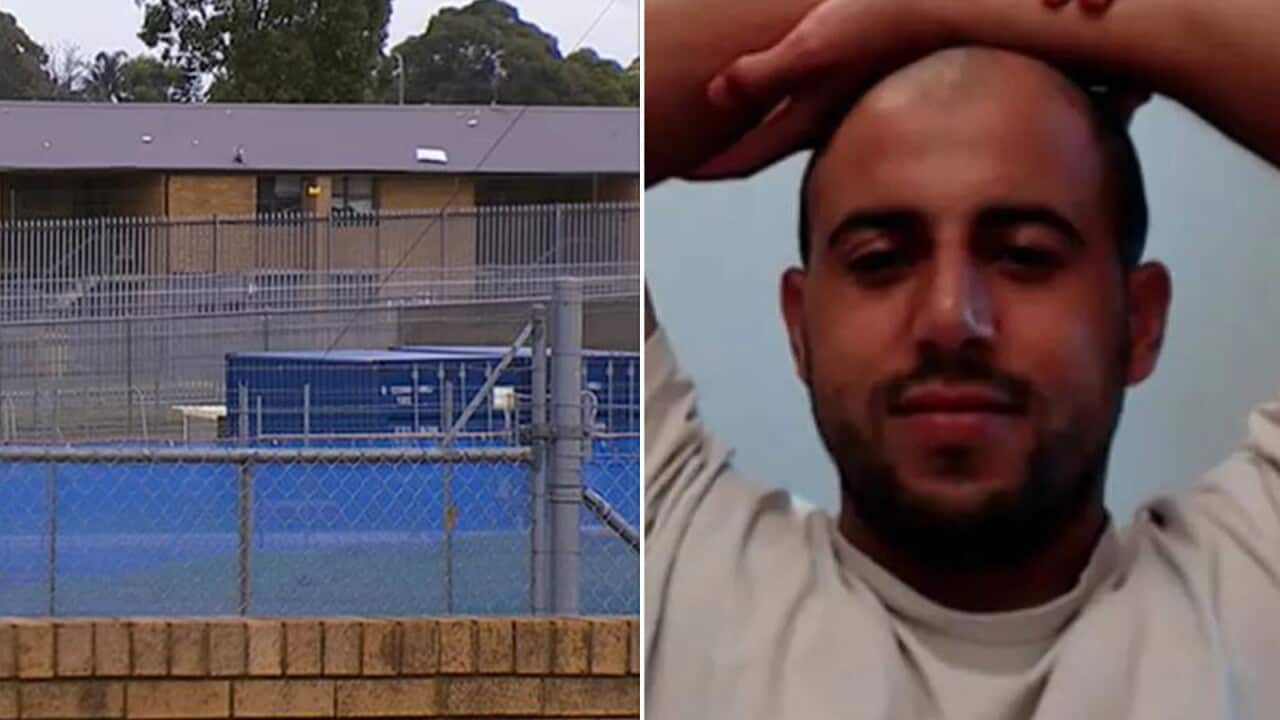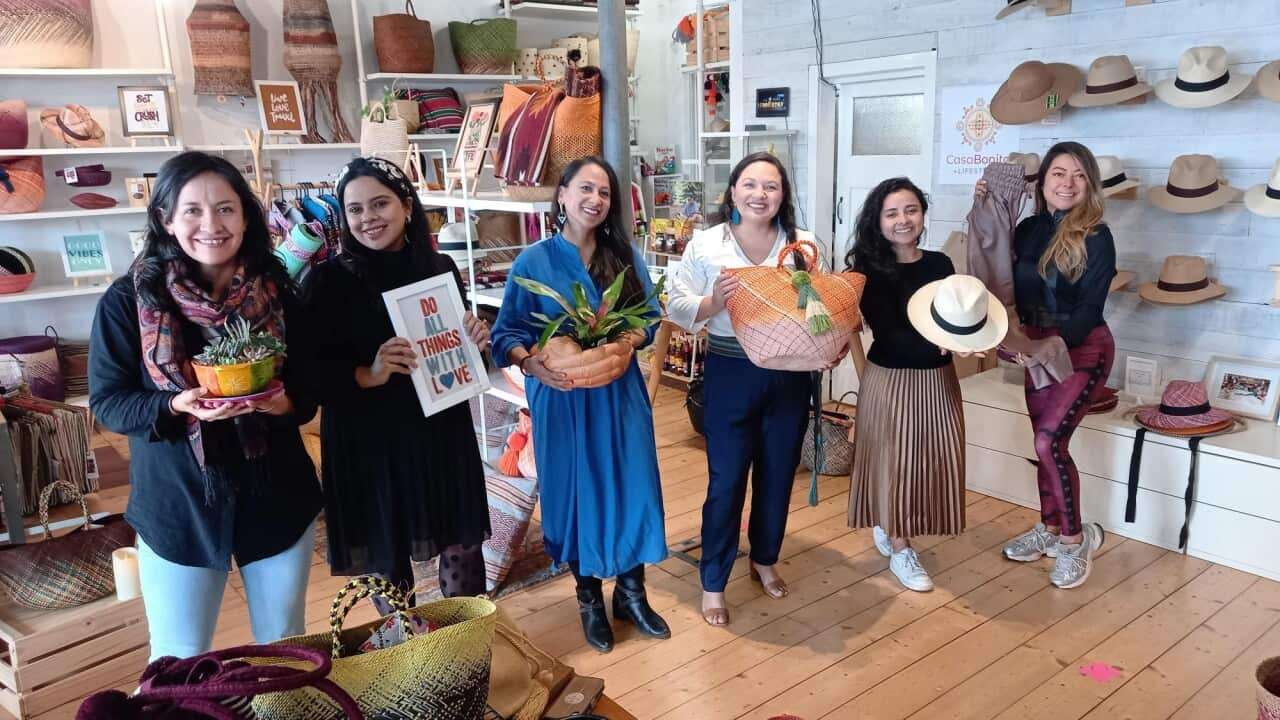

8 min read
This article is more than 1 year old
Feature
How Hedayat found work for dozens of people
Social enterprises provide work for many disadvantaged groups, including refugees and asylum seekers. With more displaced people arriving this year, Australia’s 12,000 social enterprises will play a vital role.
Published 21 October 2023 6:36am
By Sandra Fulloon
Source: SBS News
Image: CommUnity Construction founder Hedayat Osyan (centre) with Mujtaba Folad (left) and Jahangir Shadab (right). (SBS News / Sandra Fulloon)
Mujtaba Folad is a qualified engineer working with a social enterprise construction company in Sydney.
He is also a refugee from Afghanistan who fled his homeland earlier this year, after working as a surveyor and engineer in the road and transport industry.
, Mujtaba feared for his safety due to previous involvement with non-government organisations helping to rebuild that country's infrastructure.
“Living in Afghanistan was very dangerous for me because of this,” Mujtaba says.
The 25-year-old now has a permanent resident visa, and is among 87 refugees employed and trained by fellow Afghan refugee and entrepreneur, Hedayat Osyan.

Mujtaba Folad at work in Sydney. Source: SBS News / Sandra Fulloon
It’s a familiar story for Osyan, who started his social enterprise CommUnity Construction almost seven years ago to support refugees arriving in Australia with limited English language skills.
“English is the biggest barrier for us. If a refugee cannot speak good English, many doors are automatically closed. Also, many refugees have come from underdeveloped countries, and they are very traumatised," he says.
“When refugees come to Australia, their qualifications are often not recognised, so they have to start from scratch.
“This is a safe space where they can flourish, where they feel they belong, and so they can contribute to society and also support their families.”
Only 6 per cent of refugees find work within six months of arriving in the country, according to the Australian Institute of Family Studies. That number rises to nearly 25 per cent after two years.
A recent three-year study titled Bridging the Gap between Intention and Action surveyed 35 Australian employers. It found that many Australian businesses are keen to hire refugees and asylum seekers, but most do not act.
Despite available incentives and support from third parties, the report revealed even well-intentioned employers get stuck when it comes to actually hiring refugees.
That's where social enterprises step in.

Hedayat Oysan at home in Sydney. Source: SBS News / Sandra Fulloon
The business is one of 518 social enterprises across Australia certified by Social Traders, Australia’s leading social enterprise procurement intermediary.
Social Traders says social enterprises "exist to create a fairer and more sustainable world." They must do three things - have a defined purpose consistent with a public or community benefit; make a substantial proportion of their income through trade; and invest efforts and resources into their purpose so that the public or community benefit outweighs any private benefit.
And the sector is growing rapidly, according to Social Traders' new report.
“More than 110 certified social enterprises have been established since 2020,” CEO Tara Anderson says.
“Employee numbers are up by 6 per cent, trading revenue is up by 32 per cent, and this is translating into more impact."
That impact is keenly felt by refugees and asylum seekers, as Oysan well knows.
“In my own country, I was considered a second-class citizen. I was treated very badly. But when I came to Australia, I was treated with respect and dignity. From that time, I decided to work hard.”

Hedayat Osyan (right) as a teenager in Afghanistan with his cousin. Source: Supplied / Hedayat Oysan
“My world was very small because we had no access to electricity, no power, to no television. I had a very peaceful life when I was younger. It was a beautiful place, very green.”
However, this peaceful existence changed in 2006 when his father, a high school teacher, disappeared while travelling between schools. At the age of 12, Osyan became head of his household.
“I had to look after my mother and two younger siblings," he said.
“Then in 2009, the Taliban again attacked our village. At the time, my mother said to me: ‘you have to leave because last time the Taliban took your father, and now they will take you as well.”

Hedayat Oysan on his uncle's shoulder as a toddler in Afghanistan. Source: Supplied / Hedayat Osyan
With the Taliban back in power, the Hazara have been increasingly concerned for their safety.
As a 17-year-old, Osyan found a people smuggler in Kabul and after paying $5,000 set off on a nine-month journey to safety. From Dubai he flew to Malaysia, and then travelled by boat to Indonesia.
“I was arrested by the Indonesian police because I had no legal documents. I was put in a small, hot room with 50 people and they gave us only one portion of food each day,” he says.
After escaping that prison, Osyan spent five months living underground in Jakarta until finally securing a place on a boat bound for Australia.
“One of my friends left Indonesia and he disappeared in the water with other 65 people. And I feared that was going to happen to me, but I had no option."
Nine days into the voyage, the boat was intercepted by the Australian Navy. Osyan was taken to Christmas Island and later transferred to a detention centre in Melbourne.
He was just 18 when released from detention in 2010, free but facing an uncertain future in Melbourne and far from friends and family.
“It was hard, but I was very lucky to be released from detention with a permanent resident visa,” he says.
Anderson says Oysan's story is typical of many social enterprise leaders.
“Most are hugely passionate, they are innovative, they're creative and they pivot when they need to.
“That's the mindset of a social entrepreneur, they do what it takes to make their business work.”
Osyan now holds a bachelor's degree in politics and international relations and an honours degree in art and design. He was also offered PhD place, the highest degree qualification available.
“Imagine a Hazara boy who was banned from most things living in Afghanistan, coming to Australia and getting the opportunity to do a PhD. That is my dream,” he says.
However, he has put studies on hold to focus on growing his business, and is proud to be running one of Australia’s 12,000 social enterprises, which collectively employ more than 200,000 people.
In its recently released Employment White Paper, the federal government committed to back social enterprises as part of a $200 million investment announced in the May budget.
Social Services Minister Amanda Rishworth says this will help tackle entrenched disadvantage and boost employment opportunities for many experiencing disadvantage, including refugees and asylum seekers.
"We are backing social enterprises through our Targeting Entrenched Disadvantage agenda," Rishworth says.
"It is about partnering with people and social enterprises who best know those experiencing disadvantage, so we can back in the policies and programs that work,"
It’s a move welcomed by Social Traders. However, Anderson says more can still be done.
"We are calling on the federal government to create a national social procurement framework that prioritises social enterprises in business and government supply chains.

Social Traders CEO Tara Anderson. Source: Supplied / Melinda Duong / Social Traders
She says the 518 social enterprises certified by Social Traders spend around $690 million annually on delivering social and environmental benefits.
"They generated a total of $2.25 billion in annual revenue and play an instrumental role in providing jobs for some of Australia’s most marginalised groups, employing 31,429 people, including 14,013 people usually shut out of work."
Hedayat Osyan wants to play a vital role in helping new arrivals settle in and prosper.
“My goal is to expand my business nationally and add more services in order to get more refugee on onboard,” he says.
“In the next five years, I hope to open businesses in major cities across Australia, and contract medium to large projects to hire hundreds and hundreds of refugees to put less pressure on government.
Osyan’s sister and brother are living in Australia, and his mother is now in Pakistan.
“Hopefully one day we will be reunited, that is one of my dreams to be back with my whole family again.”






